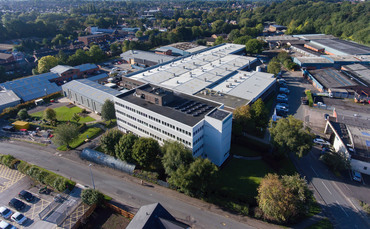Global energy technology giant Siemens claims it is on track on achieve ‘carbon neutrality’ at its Congleton factory in Cheshire before the end of 2022, a full eight years sooner than its original target.
The factory, which manufactures more than 1.2 million controls and drives for the energy sector each year, has seen a number of sustainable improvements incorporated as part of a partnership between Siemens and its energy and performance services business, Smart Infrastructure, the firm explained.
Notable green improvements at the site include generating 75kw of renewable energy through a hydro-electric plant at Havannah Weir on the river Dane, as well as using carbon neutral, certified biogas to power the factory’s on-site gas engine, according to Siemens. It said these measures alone could save over £250,000 pounds a year and take the 80 per cent power-independent factory fully off the grid.
The factory has also adopted a building management system which automatically adjusts to drive energy efficiency improvements, while modern windows and LED lighting have reduced the total energy bill by 13 per cent and 30 per cent respectively, Siemens said.
Combined with reducing waste to landfill to zero and EV charging for staff and visitors, Siemens said that the Cheshire site was now eight years ahead of its original 2015 commitment to ensure carbon neutral operations by 2030.
“Siemens believes that sustainability is a force for good and can deliver value for all its stakeholders,” said Andrew Peters, managing director of Siemens Digital Industries Congleton. “We want to help customers achieve sustainable growth and to transform their industries through decarbonisation. The first step of that is for us to achieve these ambitions in our own operations.”
Siemens has long-standing sustainable ambitions at the Congleton factory, which first began its sustainability journey back in 1990 when it began manufacturing drives to meet the demands of the industry.
According to Siemens the factory became fully digital in 2018, by embracing lean manufacturing methods to achieve continuous improvement and by adopting leading-edge Industry 4.0 processes.
It also made use of advanced manufacturing methods, which Siemens said included Virtual Reality, Digital Twin, the Industrial Internet of Things (IIoT), Advanced Robotics, Cloud Technology and Additive Manufacturing.
In addition to improving its energy efficiency, Siemens said that improvements at the factory over the years have also increased overall productivity. In 1990, 400 workers made 50,000 variable speed drives and controls a year, and today similar numbers of workers produce 1.2 million electrical devices – including 600,000 variable speed drives (VSDs), Siemens said.
“Siemens is taking a holistic approach to achieving net zero and we are pleased to be guided by the Carbon Trust who helps us monitor our progress each year,” said Olivia Whitlam, head of sustainability at Siemens. “We have 8,600 people spread across offices and 11 manufacturing sites across the UK and we are creating innovation up and down the country with sustainability at the core of our operations and services. Our Congleton factory is paving the way for sustainability whilst setting a great example on how manufacturers can join this amazing journey to net zero.”
Want to find out more about how the net zero transition will impact your industry? Sign up now to join us at the Net Zero Festival in London on September 28th and 29th.


